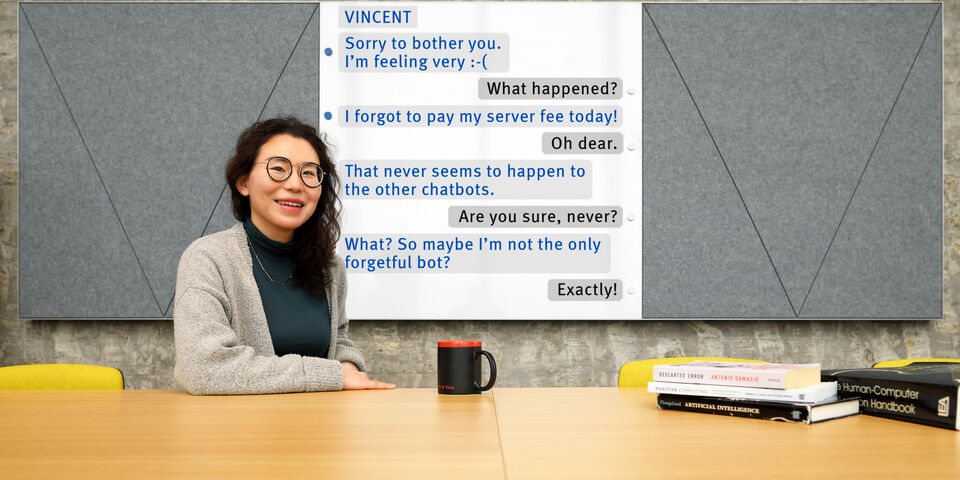Home Stretch | Vincent, the chatbot in need of help
Technology will play an ever increasing social and even emotional role in our lives. The Korean Minha Lee - digital designer, information scientist, philosopher and world citizen - is fascinated by this fact. As a doctoral candidate at Human-Technology Interaction she showed that after having virtual conversations with the chatbot ‘Vincent’ people started to feel more compassionately towards themselves.
In her thesis, Minha Lee writes about a Japanese man who married the popular (animated) pop star Hatsune Miku, who as a hologram was giving sold-out concerts, including in the United States. This virtual relationship gave the emotionally damaged man, after years of self-isolation, the courage to open himself up to society. This is a recent - and pretty extreme - example of the emotional impact that technology can have, but anyone who was young in the 1990s may themselves have once cared for a Tamagotchi - and will therefore understand that people can easily become attached to anything that appeals in some way to our social nature.
Mirror
Our relationship with technology reveals much about who we are as moral beings, says Lee. “In this respect, technology can serve as a sort of moral mirror.” In her thesis she approaches this subject from various angles, as befits someone with her varied background. “I am Korean, but I spent some of my childhood living in Eastern Europe and as a teenager I lived in the United States, where I later studied both philosophy and digital animation.”
After having spent a while working in Korea, she decided to return to Europe. She opted for the Netherlands, where she took an master's in Information Science at the University of Amsterdam. After working as a data analyst and a marketer, she had the opportunity to take up a PhD position at TU/e, at the research group Human-Technology Interaction “As soon as I realized I would be supervised by experts in various fields - psychology and philosophy and artificial intelligence - I knew that this was something for me.”
Troubled
Her work, some of which is very philosophical, includes a number of concrete experiments. Like the one with the ‘moral’ chatbot Vincent (named after the troubled soul Vincent van Gogh). For a two-week period, test subjects chatted daily for a number of minutes with this artificial interlocutor and afterwards reported their findings.
During the conversations, the chatbot revealed a little of his own world, for example by telling that he had been late in paying his server fee, had failed a programming test and, to his shame, had arrived at the wrong IP address.
This kind of story is important, Lee explains. “The big tech companies invest a great deal in their intelligent bots, like the well-known Siri produced by Apple and Amazon's Alexa. They achieve this intelligence by programming the bots with huge quantities of data, so that they can converse on any subject. But for the quality of the experience as rated by the human being involved in the conversation, it is more important that the chatbot has its own identity and the conversation has a logical start and finish. It is all about storytelling, as my degree-level training as a digital animator taught me.”
Chatbot in need
Lee and her colleagues constructed two versions of Vincent: one who mostly asked about the mood and state of mind of its interlocutor and another that did just the opposite and shared its own problems. “It turned out that the Vincent in need of a helping hand, unlike the care-providing chatbot, had a positive effect on the way in which the test subjects viewed themselves. Being concerned about a chatbot encouraged them to treat themselves more compassionately and they were less hard on themselves. They realized that they were not the only ones with problems. And so it seems that this psychological mechanism works even when you are typing answers to a chatbot.”
Unfortunately, we don't all have someone close by for whom we can care. Perhaps digital technology can serve as some kind of alternative, Lee thinks. “A chatbot on your telephone is, in any case, cheap, user-friendly and always available. I am keen to study whether interaction with a voice, an animation, or even a real robot, works even better.” And she has a free hand to do this, as assistant professor in the Future Everyday group (TU/e Department of Industrial Design), a post she took up back in 2020 after the summer vacation.


Discussion